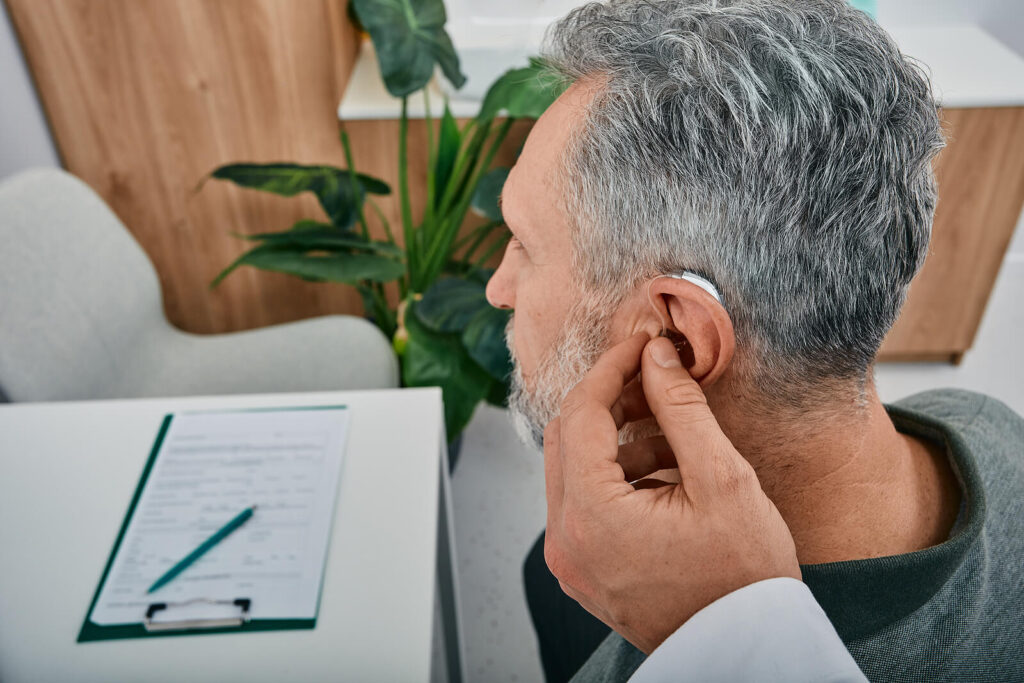What is Low Frequency Hearing Loss?
Low frequency hearing loss is a type of hearing loss where you have difficulty hearing low pitch sounds. It typically affects frequencies below 2000 Hz.
There are two main types of hearing loss – sensorineural and conductive. Low frequency hearing loss is usually sensorineural, meaning there is damage to the inner ear (cochlea) or auditory nerve. This type of damage tends to affect high frequency hearing first, but over time can progress to affect low frequencies as well.
Common causes of low frequency hearing loss include:
- Noise exposure. Being exposed to loud noises over time, such as from heavy equipment, power tools, or concerts, can damage the sensitive structures of the inner ear. This damage tends to build up first in the high frequencies, but later affects lower frequencies too.
- Ageing. As we age, all the structures involved in hearing gradually degrade. The hair cells in the cochlea become less sensitive and can die off, starting with the hair cells that detect high frequencies. After decades of ageing, lower frequency hair cells start to be affected too.
- Ototoxic drugs. Certain prescription drugs are toxic to the ear. These ototoxic drugs cause sensorineural hearing loss, typically high frequency first but eventually progressing to lower frequencies as well. Some examples are certain antibiotics, cancer medications, and loop diuretics.
- Meniere’s disease. This inner ear disorder can lead to progressive low frequency hearing loss in addition to episodes of vertigo and tinnitus. The exact cause is unknown but may involve abnormal fluid pressure in the inner ear.
In summary, low frequency hearing loss is sensorineural damage to the inner ear that specifically affects your ability to hear lower pitch sounds below 2000 Hz. It has various causes, but the most common are noise exposure, ageing, ototoxic medications, and Meniere’s. Getting a hearing test can help diagnose low frequency loss.
Symptoms of Low Frequency Hearing Loss
Low frequency hearing loss can cause a number of symptoms that may not seem related to hearing at first. Some of the main symptoms include:
- Difficulty hearing low sounds like people’s voices, doorbells, the phone ringing, and sounds of nature. Low frequency sounds become muffled or faint.
- Constantly needing to turn up the volume on the TV, radio, or phone to hear properly. Voices and other sounds will seem very soft unless volume is increased.
- Frequently missing parts of conversations and mishearing what people say, especially in noisy environments. The inability to hear low tones makes it hard to distinguish words.
- Tendency to withdraw from conversations or avoid social situations due to frustration with inability to hear. Following group conversations can become tiring.
- Thinking that others are mumbling or not speaking clearly, when in reality it is an issue with low frequency hearing.
- Feelings of isolation, depression, or mood changes from difficulty communicating. Strain is put on relationships with friends and family.
Diagnosis
Diagnosing low frequency hearing loss typically starts with a visit to an audiologist or otolaryngologist (ENT). They will first perform a hearing test, which is the main way low frequency hearing loss is diagnosed.
The hearing test typically involves an audiogram, which tests your ability to hear sounds at various volumes and frequencies. The audiogram results will show if you have more difficulty hearing low pitched sounds versus high pitched ones, indicating low frequency loss.
The exam may also include a speech recognition test to see how well you can discern speech, particularly low-frequency speech sounds like vowels.
In addition to a hearing test, the audiologist will likely also examine your ear canal and eardrum using a special instrument to see if there are any abnormalities. Imaging tests like an MRI may also be used to get a closer look at the inner ear.
It’s important to see an audiologist if you have symptoms of low frequency hearing loss like frequently missing parts of conversations or difficulty hearing certain voices and sounds. The quicker it’s diagnosed, the sooner steps can be taken to manage it or treat the underlying cause if possible. Don’t delay scheduling an exam if hearing loss is suspected.
Treatment Options
There are various treatment options that can help people with low frequency hearing loss:
Hearing Aids
Hearing aids are small electronic devices consisting of a microphone, amplifier, and speaker. They are worn in or behind the ear to increase sound levels and improve hearing ability. For low frequency hearing loss, hearing aids can be programmed to amplify lower frequency sounds specifically. Features like directional microphones and noise reduction may also help in noisy environments. Newer hearing aid models connect wirelessly to TVs, phones, and other audio devices. A hearing aid evaluation is needed to determine if this treatment option is suitable.
Assistive Listening Devices
These portable devices improve a person’s ability to hear in challenging environments. Some types of assistive listening devices include:
- Personal amplifiers – wearable amplifying devices to increase volume
- FM/infrared systems – transmit sound via radio waves/infrared signals
- Induction loop systems – convert sound into magnetic signals picked up by hearing aids
- Smartphone apps – amplify and adjust sounds through phones and headphones
Such devices can be used alone or with hearing aids to help hear conversations, TV, and phone calls more clearly. They are useful supplementary tools for managing low frequency hearing loss.
Speech Therapy
Speech therapists help people adjust and improve communication as hearing changes. They teach lip reading skills, listening tactics, and clearer speech. For low frequency hearing loss, they may focus on improving perception of deeper sounds like vowels. Therapy provides techniques to enhance conversation even when parts are missed. Support groups led by speech therapists can also help people adjust.
Coping Strategies for Low Frequency Hearing Loss
There are several things you can do to better cope with low frequency hearing loss in your daily life:
Preferential Seating
- Sit close to speakers in meetings or conversations so you can hear them more clearly.
- Position yourself with your better ear facing the speaker if you have asymmetric hearing loss.
- Avoid background noise that can make it harder to understand speech by sitting away from loud areas.
Communication Tips
- Let conversation partners know about your hearing difficulty so they can speak slower, enunciate clearly, face you, and minimise background noise.
- Ask people to repeat themselves if you miss something rather than pretending to understand.
- Use assistive listening devices like hearing aids or personal amplifiers. Carry extra batteries.
Support Groups/Counseling
- Joining local or online support groups can provide a community that understands your challenges.
- Seek counselling if you’re experiencing depression, isolation, or other emotional struggles related to hearing loss.
Safety Precautions
- Install smoke detectors, carbon monoxide detectors, alarm clocks, and doorbells that use flashing lights or vibrations.
- Be extra alert crossing streets or near traffic since you may not hear vehicles approaching.
Outlook
Treatment is generally very effective if started soon after onset of low frequency hearing loss. The success rate for hearing aids is around 95% for people who get them fitted promptly after diagnosis.
The key is not waiting too long before seeking help. Untreated hearing loss tends to get progressively worse over time. The longer it goes unaddressed, the harder it becomes for treatment methods to restore hearing to normal levels. So having regular hearing check ups is important as we age.
Early detection and management of low frequency hearing loss provides the best chance at preserving the ability to hear lower pitch sounds. This allows people to continue enjoying music, media, social activities and daily life as normally as possible. Committing to consistent use of hearing aids or implants is also important for maximising their benefit.
If you are concerned about a problem with your hearing, book a free home visit hearing test.


